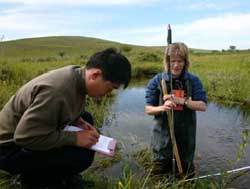
The launch meeting for the second phase of a Sino-Germany cooperative research project on the influence of rangeland management on matter fluxes in Inner Mongolia was held on 26 and 27 June at the CAS Grassland Ecosystem Research Station in Inner Mongolia.
The meeting was attended by more than 60 researchers from the research partners of the project, including chief scientists of the project from the two sides: HAN Xingguo with the CAS Institute of Botany (IBCAS) and Klaus Butterbach-Bahl with the Institute for Meteorology and Climate Research, Atmospheric Environmental Research under German Research Center Karlsruhe.
Overgrazing has led to the extensive degradation of grasslands accompanied by increased soil erosion and desertification in China. The solution of the problem requires knowledge on the impact of stocking rate and other management strategies on the biogeochemical cycles of water, carbon and nitrogen as well as on soil erosion, are thus of crucial importance. Due to differences in climate and vegetation such information cannot readily be derived from the literature but must be gathered in the area under investigation.
With the support of the Chinese and German governments, the first phase of research project entitled Matter fluxes in grassland of Inner Mongolia as influenced by stocking rate (MAGIM-I) was carried out from 2004 to 2006. Its objectives were to add knowledge to the understanding of grassland grazing in Inner Mongolia by making clear the fluxes of matter, i.e. carbon, nitrogen and water at different grazing rates; to integrate a wide range of subjects with the same aim; and to create co-operation and exchange expertise between German and Chinese Scientists.
The studies were focused on grassland in the Xilin Catchment in the middle of Inner Mongolia, covering nearly 10,000 squire km. It is considered to have climate and grazing management practices typical for semi-arid grasslands of China, including those in the provinces of Gansu, Ningxia, Qinghai and Hebei. MAGIM consists of nine subprojects.
Over the past four years, researchers from seven German universities/institutes and five Chinese partners made studies of the impact of grazing on various aspects of the typical temperate grassland of inner Mongolia such as their physical and chemical properties, the composition and turnover rate of the soil's carbon pool, aboveground and underground productivities, quantity and quality of animal products, soil moisture & hydrological processes, and greenhouse gas emission.
Thanks to their efforts, the project has obtained a host of experimental data and trained dozens of graduate students from both German and Chinese sides. Up to now, they have co-authored 18 research papers in the mainstream and disciplinary journals such as Ecosystems, Plant & Soil and Atmospheric Environment.
On the basis of the first stage achievements, the research during the new stage will expand its research scale and scope by conducting the mass flux and its controlling factors in the valley of the Xilin River while the hosts of each research topic gave their reports on the exploration of open questions preset for the topic and testing schemes.
During the meeting, the scientists of the two countries made discussions on such issues as organizing modes, project management, data sharing, and field experiments. They finally reached a consensus, calling for further strengthening of the fruitful cooperation, opening wider to the outside world and welcoming more Chinese scientists to take part in the project so that the experimental platform of the MAGIM-II might be employed to its maximum.
As a brainchild of cooperation between IBCAS and German partners, MAGIM-II will be conducive to upgrading the status and scholarship of the grassland ecosystem research, realizing a two-win success for the two sides, says IBCAS Director MA Keping. at the same time, he suggested that, the project's management of the research items be further enhanced and the substantial cooperation between the two sides be strengthened so as to enable the current drive of rewarding cooperation to go on for a long time in the coming years.
The participants also make an on-the-spot inspection in the vicinity of the Station.





